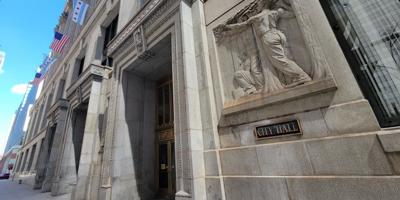
Chicago City Hall
CHICAGO - Warning that courts all over the U.S. have tossed similar climate-related stabs at big payouts from energy companies, some of the country's largest oil and gas producers have urged a Cook County judge to stop Chicago City Hall's legal action aimed at making the companies pay for allegedly "deceiving" people in Chicago and elsewhere into using the petroleum-based fuels that have driven the modern economy.
On Nov. 12, energy giants, including Chevron, BP, ConocoPhillips and others, filed a motion in Cook County Circuit Court, seeking to cut off the city of Chicago's lawsuit, accusing the companies of engaging in a campaign of "disinformation" concerning the alleged harmful climate effects of their products.
In the new filing, the energy companies say the city has no legal or constitutional basis to attempt to use an Illinois state law or Chicago city ordinance to extract payouts from the energy producers or dictate national energy and emissions policy far beyond the city's and state's borders.
"Oil and gas products fuel modern civilization," the oil and gas companies wrote in their brief.
"Governments, companies, organizations, and individuals across the globe - including Plaintiff the City of Chicago and its residents - rely on these products to heat and cool their homes, power their hospitals and schools, produce and transport their food, and manufacture countless items essential to the safety, wellbeing, and advancement of society.
"And yet, (Chicago) seeks to extract damages from 15 Defendants under the law of a single State and the municipal code of a single city for the alleged effects of global climate change - all on a theory that is necessarily based on the lawful use of fossil-fuel products by nearly every person and entity on earth since the Industrial Revolution," the companies said.
"... Allowing (Chicago's) claims to proceed would not only usurp the power of the legislative and executive branches to set climate policy, but would also impermissibly permit Illinois and Chicago municipal law to be applied to interstate and international emissions far beyond the reach of such laws. This Court should reject (Chicago's) breathtaking and unprecedented claims."
The filing comes as the latest step in a court fight that began in early 2024.
The lawsuit claims so-called "climate change" has in turn led to more frequent bad weather events, such as floods, droughts and severe storms, among other alleged harms, costing the city large amounts of money to address.
The Chicago lawsuit asserts this makes oil and gas use a "public nuisance" by allegedly also contributing to racial and social "inequities" for the city's low income and minority communities.
The lawsuit particularly takes aim at what it calls "disinformation" from the oil companies, which the city claims has misled consumers into continuing to use the products for decades after the energy companies allegedly knew of the supposed harms caused by the use of their fuels.
And that, in turn, has caused more emissions, which then allegedly accelerated "climate change" and its alleged harmful effects to Chicago, specifically.
The city's lawsuit largely copies a path blazed by other local government lawsuits against the same energy companies, as well as by earlier litigation against tobacco companies, pharmaceutical companies and others who have supplied many of the products common to American life.
The city is joined in the action by trial lawyers from the firms of DiCello Levitt LLP, of Chicago, and Sher Edling LLP, of San Francisco.
The Sher Edling firm has also served as counsel on dozens of virtually identical climate-related lawsuits against the oil and gas industry throughout the country. Published reports indicate Sher Edling has received millions of dollars in funding from a dark money group backed by billionaires, known as the Collective Action Fund for Accountability, Resilience and Adaptation." That funding has drawn scrutiny from members of Congress, who have noted it pays for the firm's lawsuits on behalf of local governments aimed at bankrupting the nation's oil and gas companies.
In the new filing, the oil and gas companies note that such lawsuits have met with little success, so far.
They noted federal and state courts across the country have rejected lawsuits leveling claims similar to those in Chicago's legal action. Specifically, the courts have rejected attempts to use state law to extract court-ordered payouts from energy providers, citing "deception" over the impact of oil and gas emissions.
They noted the U.S. Supreme Court has long held that state law cannot be used under the Constitution to back up claims "seeking relief for interstate emissions."
And the companies said state and local governments, like Chicago, can't use alleged "deception" claims to sidestep that prohibition. That is because, at their core, Chicago's claims are based on an assertion that the energy companies must pay because emissions from the burning of oil and gas products around the world allegedly caused Chicago harm.
The companies said that argument is reinforced by a growing number of court decisions in which judges specifically determined such "deception" or "public nuisance" claims are little more than unconstitutional artful attempts by governments and trial lawyers to get around the prohibitions set by federal law and the Constitution.
Those decisions have included rejections of similar lawsuits brought by a wide range of plaintiffs from New York, New Jersey, Maryland, Pennsylvania and others.
In rejecting a lawsuit from New York City against energy companies, the U.S. Second Circuit Court of Appeals specifically rejected that city's attempt to claim its lawsuit wasn't an attempt to use state law to regulate out-of-state emissions.
“... It is precisely because fossil fuels emit greenhouse gases - which collectively ‘exacerbate global warming’ - that the City is seeking damages," the Second Circuit wrote in its 2021 ruling, as quoted by the oil companies in their brief. "The plaintiff’s attempt to 'focus on' a particular '‘moment’ in the global warming lifecycle is merely artful pleading and does not change the substance of [the plaintiff’s] claims.
"The Second Circuit thus concluded: 'Stripped to its essence . . . the question before us is whether a nuisance suit seeking to recover damages for the harms caused by global greenhouse gas emissions may proceed under New York law. Our answer is simple: no.'”
In their Cook County court brief, BP, Chevron and their co-defendants also quoted from the decision of a judge in Bucks County, Pennsylvania, dismissing a lawsuit brought by that county over similar climate "nuisance" and "deception" claims.
The judge said he was "join[ing] a growing chorus of state and federal courts
across the United States, singing from the same hymnal, in concluding that the claims raised by
Bucks County are not judiciable by any state court.”
The oil and gas companies urged the Cook County judge to similarly dismiss Chicago's lawsuit, or risk making the Illinois state court a notable outlier, out of line with their judicial colleagues and the Constitution, in attempting to extend Illinois state law and a Chicago city ordinance to cover the conduct of oil and gas companies everywhere.
"If Plaintiff (Chicago) succeeded on its theory, Defendants (oil and gas companies) would be subject to ongoing future liability for producing and selling fossil fuel products worldwide unless they do so in the manner that Illinois law is deemed to require - and regardless of whether Illinois law conflicts with that of Delaware, Maryland, New Jersey, Pennsylvania, or any of the other 45 States, let alone numerous foreign jurisdictions," the companies said in their brief.
"Indeed, under Plaintiff’s theory, Defendants could be liable under Illinois law for statements made and emissions released in South Carolina, Pennsylvania, and New Jersey even though courts in those States have already held that there is no viable claim under those States’ laws. Such a scenario is entirely unworkable and would lead to absurd results, which is why these inherently federal claims cannot be brought under state law."
The city of Chicago has not yet responded to the motion to dismiss. And Cook County Judge Allen P. Walker has not yet ruled on the motion.
The oil and gas companies are represented in the action by attorney Patricia Brown Homes and others with the firm of Riley Safer Holmes & Cancila, of Chicago; Stephanie A. Scharf and others with the firm of Scharf Banks Marmor LLC, of Chicago; Nicole C. Mueller and others with the firm of K&L Gates, of Chicago; H. Patrick Morris and others with the firm of Johnson & Bell, of Chicago; Patrick P. Clyder and others with the firm of McGuireWoods LLP, of Chicago; Suyash Agrawal and others with Massey & Gail, of Chicago; and Sean M. Berkowitz and others with Latham & Watkins, of Chicago and San Francisco.
They are also represented by attorneys with the firms of Gibson Dunn & Crutcher, of Los Angeles, San Francisco and Washington, D.C.; Wilmer Cutler Pickering Hale and Dorr, of New York, Washington, D.C., and Boston; Paul Weiss Rifkind Wharton & Garrison, of New York; Debevoise & Plimpton, of San Francisco and New York; Sullivan & Cromwell, of New York and Washington D.C.; Susman Godfrey, of Houston; and Stern Kilcullen & Rufolo, of Florham Park, New Jersey.






